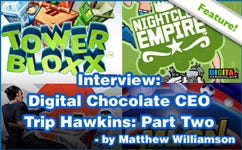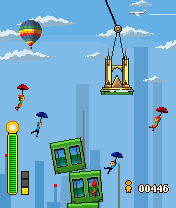Trending
Opinion: How will Project 2025 impact game developers?
The Heritage Foundation's manifesto for the possible next administration could do great harm to many, including large portions of the game development community.
Games on Deck got a chance to sit down with Trip Hawkins, CEO of Digital Chocolate on the first day of this year's Game Developer Conference. In this second part of a two part interview, we talk to him about his company, their current line-up of software, and the unique aspects of the mobile games industry.

 Games on Deck got a chance to sit down with Trip Hawkins, CEO of Digital Chocolate on the first day of this year's Game Developer Conference. In this second part of a two part interview, we talk to him about his company, their current line-up of software, and the unique aspects of the mobile games industry. The first part of this article, including Hawkin's thoughts on digital distribution, can be found here.
Games on Deck got a chance to sit down with Trip Hawkins, CEO of Digital Chocolate on the first day of this year's Game Developer Conference. In this second part of a two part interview, we talk to him about his company, their current line-up of software, and the unique aspects of the mobile games industry. The first part of this article, including Hawkin's thoughts on digital distribution, can be found here.
[Trip pulls out a package of information on Digital Chocolate's games.]
Trip Hawkins: Just to give you an idea of how we think differently about gaming...
Games On Deck: I have this game [Tower Bloxx] on my phone, and it's pretty much the only game I play on my phone anymore.
TH: OK, so you already know Tower Bloxx. Of course we came up with a strategy game to keep the game more interesting.

Tower Bloxx
GOD: That is what actually keeps me playing, trying to get my town to maximum capacity.
TH: Yeah, this a case where we had to listen to the market place, we didn't just stick it out there. We did research with consumers, we went and showed prototypes to the operators. Things like the themeing with the people coming in on their umbrellas and the whole strategy game, all of that came in later because of feedback that there wasn't enough to the game.
GOD: I feel that the strongest point of the game is that the controls work well as a mobile game. Far too frequently a mobile phone game's controls are overly complicated.
TH: Yes, exactly, exactly. And frankly I feel that way about console games also.
You know, back when I was at Apple, gosh almost thirty years ago, I was a very strong advocate of using the mouse and a very strong advocate of there only being only one button on it. And so I feel like there was something lost in the industry when Microsoft beat Apple and started putting more buttons on the mouse.
GOD: I think I have seven buttons on my mouse.
TH: Yeah, it's just too much.
Here we take in that sort of same model of one button gameplay and put it into the Tycoon genre. [Trip turns to a page on Nightclub Empire] Clearly this is a theme where you're running a nightclub which will appeal to the younger audiences that have mobile phones. It has a tie into music, and here's a chance to cross from mobile to music industry.


Nightclub Empire, Mafia Wars: Yakuza
[The game] Rollercoaster Rush is a little bit of a sim because you're running the roller coaster but it has the same kind of simple one button mechanic as Tower Bloxx. You're driving the physics and the satisfaction of the riders.
And of course we have some more traditional genres like Mafia Wars. This is the latest version called Mafia Wars: Yakuza. Again, pretty simple controls with auto targeting so even though its an isometric view and you don't have diagonals on the D pad, we take that into account to make the play simple. So even though it's an action game and you are depending on your dexterity to a degree, you're not frustrated by what the handset can't do. Then for those hardcore gamers we have these levels like the tower of doom where there's one hundred and five floors that you can go through. People really get into playing it for a much longer period of time.
And then Tornado Mania. This game got a perfect score from IGN.
GOD: Does that play as well as those screen shots look?
TH: Yeah, it does, it does. Katamari Damacy was kind of an inspiration for us in realizing "yeah, ya know, why not be something like a tornado?" So of course there's the element of destruction, but there's a story line where it's all for a good purpose and you get this feeling of taking care of a city and taking care of the virtual people who live in it. So we've learned a lot about the user interface, the gameplay mechanics, the theming, and of course trying to present original ideas around that.

Tornado Mania
These are some screens from that MLSN where you answer these multiple choice questions and you find out later how you did and you get little virtual trophies that go into your trophy case.
GOD: I see, then this makes a bit more sense to what you were saying earlier.
TH: Right. Again, it's very simple to play.
Most recently we have introduced AvaPeeps where you create an avatar by starting with what they look like. Then you answer some multiple choice questions to program your personality profile. Then you get to send your avatar off to a virtual location like the Glitterati Lounge or the Hip Hop club.
GOD: So it's a dating sim?
TH: Basically, yeah. Of course a lot of single people are in fact looking to meet people and this gives them plausible deniability. They don't have to admit that they've gone to eHarmony or Match.com. They say "Ohhh I'm just playing this game with avatars."
GOD: So it works with real people? It's a dating sim mixed with a match making game?
TH: Yes. If I create my avatar and send it off to meet with other avatars and it comes back later and shows me who I've met and then I can ask them out for dates. When they go on a date they generate a story based on what happen on the date. It's lining up the personalities and the choices that the two avatars made.

AvaPeeps
GOD: That's far more interesting than a dating sim.
TH: Yeah, well we found out within... this is amazing. We launched this thing on Boost Mobile which represents about 2% of all the handsets in the US, a small slice of the market. Within a couple days we had served over three million pages from our server. We had customers that were hyper dating, like one guy within a day or two had been on twenty eight dates with the same other avatar. They were at the top of the leader board. Speed dating was going on that we just didn't anticipate. The average player is sending twelve messages a day that are just custom messages they're sending in the game to other avatars. Within a week we started getting emails from people that had their avatars meet in that game and actually met and started dating in real life.
GD: Really?
TH: Yeah! Within a week [laughs]. Yeah, so, it's a brave new world. So now you can kind of see how we try to market these things.
GOD: I got my wife addicted to Tower Bloxx...
TH: Clearly you can see there where women have become a really big part of the casual gaming market on the web. They have the same potential to be a major force in mobile. Anytime you can take any kind of gameplay experience and give it some social value, it's going to be a much bigger deal and you're going to attract much more of those consumers.
GOD: I've spoken with a few people mobile gaming on mobile gaming and I hear that a lot of the problems they have is when they're asked to make a game based around a license and they're not given the creativity they need.
TH: Yeah, that happens all the time. Usually the way it happens is that a publisher knows a product is late or that the product is not selling very well and they have a hole. They'll think "well, we have got to do something," and then they'll find out "oh, well this movie license is available. The movie is coming out in four months. OK, great, now we need a game that's got to ship in this timeframe." Then they start calling around to outside developers to try to find somebody who has some free capacity. And then they don't have any time.
GOD: So how does Digital Chocolate feel about accepting something like that?
TH: We just wouldn't do it. We turn them down all the time.
We don't mind the idea of working with a license if we think that there's a good fit and a proper, correct, game that can be made. But you know, you need to be able to spend the right amount of money to do a great job on the game. If you have to chew up too much money on the license and then you don't have any time you're asking for trouble. And then if you turn off the customer who tries it then you've ruined the future value of the industry.
We need to make sure that people who are intrepid enough to try a mobile game have a great experience. You want to make sure they come back for more. You want to make sure they're talking to their friends about it.
So the best way to grow the industry is with original titles for mobile that are worthy of buzz. You know, that quality and originality to have people start talking about it. The same way that you did in showing Tower Bloxx to your wife.
GOD: Honestly, Tower Bloxx was the first game that anyone had come up to me and told me that I had to try. In turn I showed it to my wife, and I know she then went on to infect others.
TH: Yeah, see the opposite of that is if you're a big fan of Star Wars, which is a big screen experience, and then try a mobile game based around that property it's just not going to really feel like Star Wars to you. Or if you try Madden, it has to be dumbed down quite a bit to be on a mobile phone. So either then you're not going to talk to your friends about it because maybe you're kind of embarrassed that you fell for it, or if you say anything at all it's going to be negative.
GOD: You had mentioned that you were a proponent of the single mouse button for Apple. It seems like that has carried over all these years. What do you find most similar about working on a mobile environment?
TH: You know over the last thirty years I've seen hundreds and hundreds of platforms come and go. It's always exciting being on the frontier and working with new media and new platforms and trying to imagine what is unique about them and compelling. And then how to create value around that. The challenge is always the same in terms of looking at the technology and wrestling with it to create a good experience for the user and making it as accessible as possible. You know, making sure the subject matter has relevance, again, just trying to fit it to the platform.
One of the things I did this morning [in my keynote] is I gave the example of the Nintendo DS because so many people in mobile want [mobile gaming] to be a second-rate version of something else. Second rate TV. Second rate music player. Second rate game console. And they want to put the same brands on it. Where it doesn't have to be that way. It can be first rate platform. It can be the best in the world at certain things.
Nintendo exemplifies this with the DS and with the Wii. Just to use the DS as an example, if they had been risk averse they would have said "hey, we have all this money tied up in R&D, manufacturing, inventory, and storage. We have to sell it otherwise we are screwed. Let's put Mario on it." Now if they had launched it that way it would have been a second rate Mario. So as a consequence they specifically didn't offer Mario. Instead the looked at the platform and they said, "alright, who's going to use this? How? Where? Why? For how long?"
They looked at the rhythm and the tempo of how it would be used differently because it's a mobile device and they came up with Nintendogs. And they came up with a model with two screens, and a stylus, and really approached it in a fresh and original way. I guarantee you that I know first hand that it's a first rate platform because I gave it to my two kids one Christmas and they would actually play it at home sitting on the sofa in the same play room where the Gamecube was.
You see this with the great mobile games: customers get hooked on the game and then it's their "jones." They'll play it at home instead of turning on these more powerful technologies.
GOD: How do you look at the future of mobile gaming? Where do you see all this going? That mobile games will eventually be their own "console"?
TH: Yeah, it's clearly going to be the most ubiquitous gaming platform. There's going to be billions of people doing downloads and playing in different ways. I think the mass market will be defined by a much larger audience doing things that are more casual. It will be a bigger audience than we've seen on the PC, and than we've seen with console gaming. And that's a good thing because I think that to a degree... obviously I grew up playing a lot of hardcore games and I fit the profile of hardcore gamer. But I really prefer playing with other people. I love to play with my kids, I love to play with other family member and friends.
You've got to figure out a way to have a gaming experience that they can handle. We've all done this right? Where you invite a friend over to play Madden, you mop the floor with your friend and then he never comes back to do that again.
GOD: Or he gets angry and throws your controller and then you have to buy a new one.
TH: Yeah. I mean, we all get a kick out of doing that occasionally, but I'd say I've had more of an emotional delight in playing much more casual games and having other people be able to beat me, and then just be thrilled that they beat me. Now they're really into games and they want to go another round.
Obviously in a lot of these more casual games, luck is a bigger part of it. It's not as demanding for the new users, so they can actually feel more competent more quickly. I think that's true about any medium: you want people to feel more comfortable and start getting immediate entertainment benefit and feel competent. Get the dopamine reward system cranking.
You see this with people who enjoy things like slot machines in Las Vegas. It's very popular. So with all due respect to the ability we might all have as members of the industry to conceive build and play much more demanding hardcore games, the general public is happy to be engaged in something that's not quite so demanding.
I don't really want to build slot machines, I'd rather build things that do involve a little bit of skill, a little bit of strategy, a little bit of thinking and competitive elements. But you don't have to have overkill. Hopefully with our game designs you get a little bit of both. I've always said great games should be simple, hot, and deep. You have a game like Tower Bloxx where it's really easy to play the quick game, but it's also got really nice visuals and themes to go with that. So it's more than just that simple mechanic, there's something more powerful there. Then obviously, if you want to get into it more deeply you start playing the strategy and now you're running the whole city. There's more depth there if you want it.
[Matthew Williamson is the creator of The Gamer’s Quarter, an independent videogame magazine focusing on first person writing. His work has been featured on MTV.com, 1up.com, Chatterbox Radio, and the Fatpixels Radio Podcast.]
Read more about:
FeaturesYou May Also Like